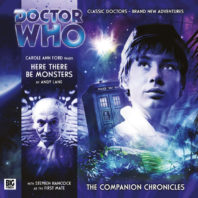
Released July 2008
The Companion Chronicles through its first eight releases proved just how easily the early eras of Doctor Who could transition to the audio medium even with a limited cast and time allotment, focusing on character and atmosphere without sacrificing any imagination in these very polished affairs. Beginning the third series in what marked a shift to a year-round monthly release schedule, Andy Lane’s ‘Here There Be Monsters’ sees the First Doctor, Susan, Ian, and Barbara land aboard the Earth Benchmarking Vessel Nevermore with the fate of the universe at stake because of the holes Captain Rostrum is punching into the very fabric of space to facilitate navigation.
Susan as a character is arguably one of the most fascinating in all of Doctor Who despite often being cast in more helpless situations and being used as a plot device to showcase the paternal and caring side of the initially gruffer First Doctor. Despite appearances, she is much older than Ian and Barbara who have likewise taken up a protective role over her, and Carole Ann Ford absolutely excels when given small moments to delve into the thought processes fueling her character who remained relatively unexplored during her televised tenure. Indeed, this is a woman maturing before everyone’s eyes, and though she earnestly believes her grandfather is correct in his course of action, she also believes that she may holding him back in his adventures; faced here with the prospect of being forced to remain in one location with her grandfather stifling her development through an overabundance of care, the thoughts of leaving her extended family despite the loneliness that will ensue have begun to enter her mind, making her eventual decision to leave in the future all the more nuanced and impactful as a result.
Similarly, this is a story that understands the nuances of the First Doctor, and the reminder that he left his planet to explore the universe rather than to watch Susan reaffirms just who this strange traveler truly is. Though he has not yet formed the bond with the TARDIS that is so fabled among his people, he has absolutely formed a firm moral compass, and the discovery that Rostrum is quite literally destroying parts of space brings out a righteous indignation he can barely put into words. At the same time, he realises that he may have to sacrifice his TARDIS to save the universe, and the decision is fittingly one that he struggles with at this point in his travels.
The story itself is quite straightforward despite some incredible ideas on display, and the visuals accompanying the ship’s actions and the vegetative captain with roots and leaves throughout the corridors serving as cameras are spectacular. Events move at a very deliberate pace to help build up the tension and the mystery surrounding an unknown figure who seems to be affecting the livelihood of the captain, but although the shades of distrust Rostrum holds for the travelers does create some extra dramatic hurdles, the eventual revelation that there are creatures from the other side of the tears in space that are antithetical to life on this side is delivered without any sort of pomp to underscore just how momentous this discovery is. Still, it does tap into the wonder and scope of early Doctor Who perfectly, and the strong direction and sound design wonderfully complement the imagination and character exploration on display to deliver yet another strong entry in this early range.
- Release Date: 7/2018


Leave a Reply